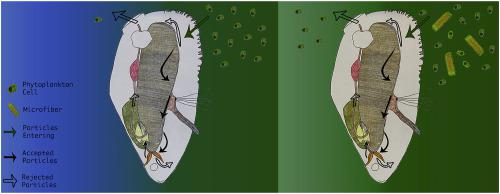Environmental Pollution ( IF 7.6 ) Pub Date : 2020-07-10 , DOI: 10.1016/j.envpol.2020.115184 Eleni Christoforou 1 , Davide M Dominoni 2 , Jan Lindström 2 , Giulia Stilo 3 , Sofie Spatharis 1

|
The biofiltration capacity of bivalve populations is known to alleviate the effects of coastal eutrophication. However, this important ecosystem service could potentially be impaired by the increasing microplastic abundance in near shore environments. It is known that relatively large microplastics (∼500 μm) impair the filtration capacity of bivalves. However, the effect of smaller microplastics, and specifically microfibers, is not known even though they are more common in many natural systems and similar in size to phytoplankton, the main food source of mussels. Here, we investigated the effects of long-term exposure to microfibers (MFs), which are smaller than 100 μm, on the biofiltration capacity of the blue mussel, Mytilus edulis. Our findings show that long-term exposure (here 39 days) to microfibers significantly reduced (21%) the clearance of phytoplankton (Tetraselmis sp). While previous studies have shown that larger microplastics can decrease the filtration capacity of mussels after short-term exposure, our findings suggest that, for smaller MFs, mussel’s clearance capacity is significantly affected after long-term exposure (39 days in this study). This may be due to the accumulation of MFs in the digestive system. In addition, the most efficient phytoplankton consumers were more susceptible to MF accumulation in the digestive system. This suggests that prolonged exposure to MF of coastal mussels could negatively impact the biofiltration of more potent individuals, thus decreasing the ecosystem service potential of the population as a whole.
中文翻译:

长期接触微纤维对沿海贻贝提供的生态系统服务的影响。
已知双壳类种群的生物过滤能力可以缓解沿海富营养化的影响。但是,近岸环境中日益增加的微塑料含量可能会削弱这一重要的生态系统服务。众所周知,相对较大的微塑料(约500μm)会损害双壳类动物的过滤能力。但是,即使较小的微塑料,尤其是微纤维,在许多自然系统中更常见,并且其大小与贻贝的主要食物来源浮游植物相似,其作用尚不清楚。在这里,我们调查了长期暴露于小于100μm的超细纤维(MF)对蓝贻贝Mytilus edulis的生物过滤能力的影响。我们的研究结果表明,长期暴露于微纤维中(此处为39天)显着降低了浮游植物(Tetraselmis)的清除率(21%)sp)。尽管先前的研究表明,较大的微塑料可以降低短期暴露后贻贝的过滤能力,但我们的发现表明,对于较小的MF,长期暴露后贻贝的清除能力会受到显着影响(本研究为39天)。这可能是由于MF在消化系统中的积累。另外,最有效的浮游植物消费者更容易在消化系统中积累MF。这表明,沿海贻贝长时间接触MF可能会对更有效个体的生物过滤产生负面影响,从而降低整个人口的生态系统服务潜力。









































 京公网安备 11010802027423号
京公网安备 11010802027423号